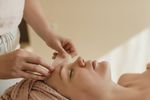This ancient form of healing can address a long list of modern maladies. Here, everything you need to know.
"Acupuncture is one of the oldest forms of healing in the world, and it's been in practice for thousands of years," says Kirsten Tempel, practitioner of acupuncture and traditional Chinese Medicine (TCM).
The modality involves the insertion of super-thin needles to stimulate points on the body to balance the flow of vital energy (Qi).
Although Chinese Medicine is often viewed as an "alternative" therapy, even modern medical organizations such as the National Center for Complementary and Integrative Health (NCCIH) tout its ability to restore health. From pain and anxiety to digestive issues and fertility, this practice can treat a variety of health issues and the benefits of acupuncture are wide ranging.
Read on for more, from the experts.
How does acupuncture work?
When there are blockages within the body, it can restrict the flow of energy and accentuate pain or other health problems, explains the American Institute of Alternative Medicine (AIAM). Acupuncture is thought to increase blood flow and remove those blockages, thus promoting healing and pain relief.
“Imagine having a river and a dam — the goal is to open the dam and get everything moving,” explains Sher. "Increasing blood flow frees up stagnation and increases 'Qi' (or energy) to an area."
"Acupuncture is thought to increase blood flow, thus promoting healing and pain relief."
Within acupuncture, there are two schools of thought on where the needles are placed, explains Gabriel Sher, L.Ac., an acupuncturist in New York. One believes that needles (or pins) should be inserted locally in an area of a problem. The other believes work should be done away from sites of pain, utilizing energy channels throughout the body to return it to homeostasis.
Interested in giving the practice a try? Experts say there are very few risks to doing so — and a slew of possible benefits.
Science-Backed Benefits of Acupuncture
Although this modality has been in use for thousands of years — long before medical journals existed — modern-day research also supports the benefits of acupuncture.
One of the most popular uses for acupuncture is to help treat chronic pain. In Chinese Medicine, practitioners look at the body in the form of energy, explains Tempel. If you have low back pain, for example, an MRI might not show the source of your pain if there are no any structural issues at play. But in acupuncture, pain means there’s stagnation in the body and finding balance is key. Science backs this up: The practice has been shown to help relieve pain, especially in your back and neck.
Acupuncture can also help relieve stress and anxiety. "Stress is an energy — and if you hold onto it, you might wind up with muscle tension, headaches or other bothersome symptoms," Tempel says. "Acupuncture helps you release that energy. We’re putting your body back into balance and inducing a state of relaxation is part of that."
RELATED: Energy Medicine Treatments for Anxiety
Sher likes to turn to acupuncture for gastrointestinal problems such as bloating, diarrhea, Crohn's disease, constipation and gas. It can also support people dealing with IBS symptoms.

Treatment Room at THE WELL New York
Acupuncture has also been shown to take hypertension (a.k.a. high blood pressure) down a notch. While it shouldn't be the only treatment for hypertension, research suggests it could be a helpful complementary tool. It's also been shown to help relieve seasonal allergies and have promising effects in relieving pain from migraines.
Finally, women struggling with gynecological issues, such as painful cycles, PMS symptoms or even fertility can also reap the benefits of this ancient practice.
RELATED: 5 Fertility Health Myths Busted
What to Expect From an Acupuncture Session
An acupuncture session should always begin with a consultation, where you’ll talk through any issues you’re having with your practitioner. Chinese Medicine views the body as a whole unit where every part is interconnected. Because of this, your practitioner will likely want to hear about your sleep patterns, emotions, energy levels, digestion, bowel movements and more, explains Sher.
If you are receiving acupuncture from a Chinese Medicine practitioner, he or she will also likely look at both your tongue and feel your pulse as both detail what has been going on in your life for the past few days or weeks, he says. From there, you’ll lie face up or face down on the acupuncture table and have anywhere from 12 to 25 needles inserted into different acupuncture points all throughout the body.
If the thought of needles freaks you out, don't worry! Acupuncture needles are as thin as a strand of hair and bendable, unlike the needle of standard medical shots. Some people don't feel anything when they're inserted. However, if you do feel a pinch, it’ll feel like having an eyebrow hair plucked, Tempel explains. Once the needles are in, you’ll likely feel relaxed, she says. Some people even fall asleep.
"Of course, each point is different," notes Sher, "And if you’re needling into an area of pain, it might be more sensitive. But even then, it’s nothing like getting a shot at the doctor’s office."
"Once the needles are in, you’ll likely feel relaxed. Some people even fall asleep."
The needles usually stay in for about 20 minutes. If you’re aiming for relaxation, they may require a longer amount of time; if you’re looking to strengthen an area, it may take less time.
While you can see results from just one visit, Tempel usually recommends about three to five sessions. Acupuncture can also be used in tandem with other forms of Chinese Medicine such as cupping (in which special cups are placed on the skin to create a vacuum, boosting circulation and promoting healing) or gua sha (a therapy that involves rubbing or scraping your skin with a smooth tool as a way of moving stagnant blood, relieving pressure and balancing energy.)




